This year I was thrilled (and when I say thrilled, I mean bricking it) to be on panels at YALC (the Young Adult Literature Convention in London) and DeptCon4 (the biggest YA convention in Ireland, organised by Easons’ Department 51).
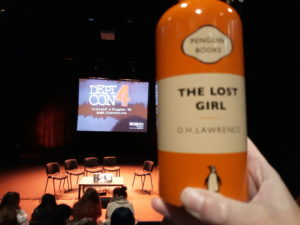
I have a notoriously bad sense of direction, but I made it to DeptCon without getting lost!
Things I’ve learned from Lit Conventions:
- Waiting to go on is worse than being on.
- Your editor will be completely sympathetic about your nerves. She’s probably a shy, bookish type herself.
- Every writer has a publicist/press officer following them around and looking after them at events, like a dæmon in His Dark Materials. It’s so cool. I had one too, but she was there to look after way more important Walker writers than me.
- The Green Room is where the authors wait to go on stage. It’s full of snacks but you will be too nervous to eat them.
- Don’t even think about going to a YA event if you don’t know what Hogwarts House you’re in. Just do the test. (Hufflepuff rules! In an unobtrusive way.)
YALC was a three-day whirlwind of frenetic teenage energy in an overheated hall on the floor above ComicCon. Several of the stars at ComicCon came up to wander through our floor, causing quite a stir (I saw Kahl Drogo from Game of Thrones!) Apparently last year Benedict Cumberbatch came up several times. I’d definitely have fangirled him.
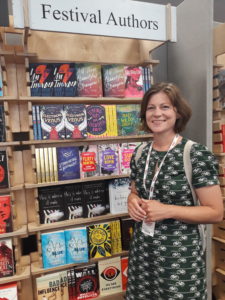
Flying Tips beside Julie Mayhew’s amazing The Electrical Venus!
So I got to go to London for 3 days, and hang out with my editors, who are just so lovely I get a little bit emotional about it. I was so well looked after.
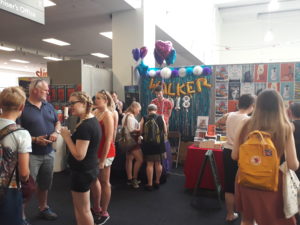
The Walker booth
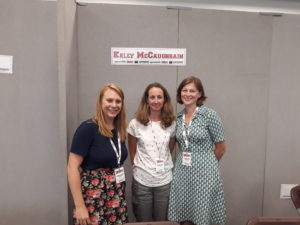
My lovely editors. Emily has actually been on a trapeze. I am so jealous.
I took some time off on Saturday to visit Kew Gardens because I am a huge garden geek and I’d never been there before. I decided I’d just go for a couple of hours. In fact, I arrived just as they opened, and they had to throw me out at closing time. It’s huge! The best bit was there was a guy doing a trapeze act in the roof of the temperate glasshouse! Serendipitous or what? No safety net, no protective gear, my heart was in my mouth.

Magical
My YALC panel was on Sunday and included Hayley Barker, Christina Henry and Julie Mayhew, who have all written amazing circus-related books that were a joy to read. I felt very honoured to be on their panel. I was a little nervous but Hayley was a fantastic panel moderator and made the whole thing a breeze. I’d told my editor that if I froze on stage she was to jump up, point in the opposite direction, and shout, ‘Look! Benedict Cumberbatch!’ but fortunately the need did not arise. There was a rumour we were going to have to lead a singalong of This is Me from The Greatest Showman but all four of us decided that our talents lie in other areas and no one needed to hear us sing. Phew.
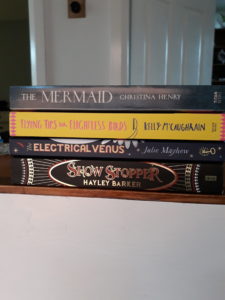
Books from my panel. I highly recommend all of them.
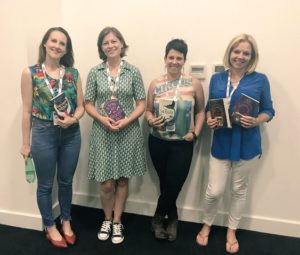
Julie, me, Christina and Hayley, all feeling relieved we don’t have to sing.
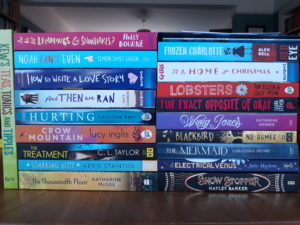
My YALC haul. And I was on a plane home!
DeptCon4 was a two-day event, a bit like YALC, with panels and signings. This year had 10 panels (plus a DnD sesh) featuring about 35 writers.
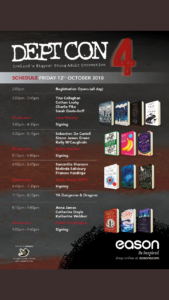
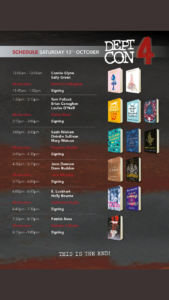
My panel included the wonderful Simon James Green and Sebastien de Castell, and was chaired by Katherine Webber (there was much fangirling).
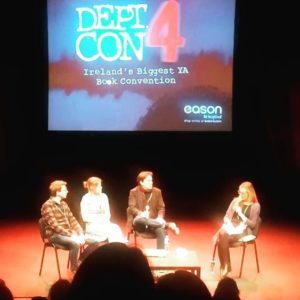

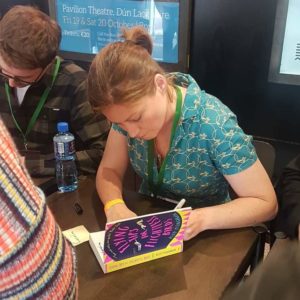
You could tell I was the newbie writer because:
- I went to all of the panels (except the DnD because it was either eat or faint at that point)
- I took notes
- I brought all my books and asked people to sign them in the green room
- I was shamelessly fangirling all over the place
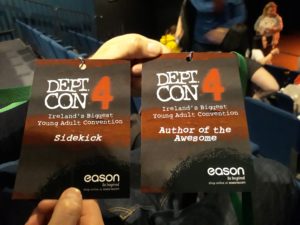
If you think I’m exaggerating about the fangirling, here’s a brief resume of my long history of embarrassing myself in front of writers I admire:
- Marilynne Robinson had to tell me to stop asking questions so someone else could ask one.
- George Saunders had to introduce himself to me because I couldn’t speak.
- Roddy Doyle agreed to read my book (possibly to get rid of me).
- Susin Nielsen probably thinks I’m a crazy stalker after I ran up to her on the street in the dark yelling, ‘Oh wow, you’re Susin Nielsen!’ Which she probably already knew.
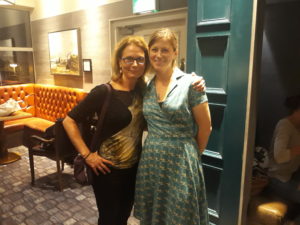
Fangirling Susin Nielsen, my FAV YA writer! She was so lovely.
I am very shy, and I deal with this by either gushing at jetlagged writers in a hyper manner or running away to eat crisps in the hotel instead of hanging out in the green room with the cool people. But I did make it to the pub this time and managed to chat to a few of my heroes.
And it turns out, the things writers say on their panels are only nearly as interesting as the things they say in the pub afterwards. I was so inspired I scribbled down notes (when I got back to the hotel, I’m not a complete loser. And I didn’t have a pen).
So I’m going to give you a list of the helpful things they said. I’m not going to ascribe names, (because I didn’t ask anyone if I could quote them and also I wouldn’t be quoting word for word, these are just my summaries) but they came from the likes of Susin Nielsen, Deidre Sullivan, Tina Callaghan, Sebastien de Castell, Juno Dawson, Simon James Green, Brian Conaghan, Louise O’Neill, Tom Pollock and Patrick Ness. Some of them came from conversations in the pub, and some were things people said in panels.
- The book I’m publishing next was started 6 years ago. Never throw anything out.
- Be kind to yourself, ignore the mean voice in your head.
- You must have a conflict engine in each act. Something that generates conflict after conflict.
- Don’t give up today because tomorrow could be the day it happens.
- I’ve never written two books in the same way.
- Sometimes you have to abandon things but never throw them out, you can come back to them later.
- It gets harder with every book.
- I hate prizes, even when I win. It’s best to ignore everything that’s written about you.
- Your book should have things in it that you didn’t know were there, that come out as if by magic when you’re done, because the whole is more than the sum of its parts. But if you plan it all to death and try to fit it to a formula, you won’t get those bits. You’ll probably delete them before you’re done because they don’t fit the plan.
- Writing a sequel can be a good way to avoid second book syndrome because you don’t have to fall in love with new characters. But then your third book will be your second book.
- Get feedback on your work before you send it out. Learn to ask for help.
- Be resilient. Do something else that’s creative when you’re stuck, don’t force it.
- You write your first book not knowing how to write a book. Then you think, ‘I’m a proper writer now, I should start learning about writing,’ so you read up on craft and story theory and you try to make book two fit a formula and it doesn’t work.
- Don’t let them cast 31 year olds to play the 16 year olds in the film of your book.
- It’s not fair that American books dominate the market.
- The work is the antidote for everything.
- Anyone can start a book. Writers finish them. If you’re obsessively going back over the first three chapters, stop. Finish the book.
- Talent is almost irrelevant. It’s more important to enjoy it enough to do the work to make it good.
- Perfectionism is the enemy of creativity.
- If you believe the good stuff that’s said about you, you have to believe the bad, so it’s best to ignore it all.
- Write a story, not a sermon. The things you care about will come out in the story. If they don’t, you’re writing the wrong story.
- I had 217 rejections in 10 years before my first book was published.
- If your shoe has a hole in it, and it’s raining, wear the hotel shower cap over your sock.